Rules and Regulation of Business Law
VerifiedAdded on 2021/02/20
|11
|3468
|474
AI Summary
Thus, Business law rules are regulated in relation to formation of company, managing their internal and external activities and also the rules in respect of dealing with other business in legal form (Business Law and Regulation, 2019). In relation to English Legal System the laws are implemented in respective matters of civil law and criminal law. This law is mainly imposed if any such disputes arise in any of this factors than judgement and decision is to be given by keeping the norms and rules of European law (Picciotto and
Contribute Materials
Your contribution can guide someone’s learning journey. Share your
documents today.
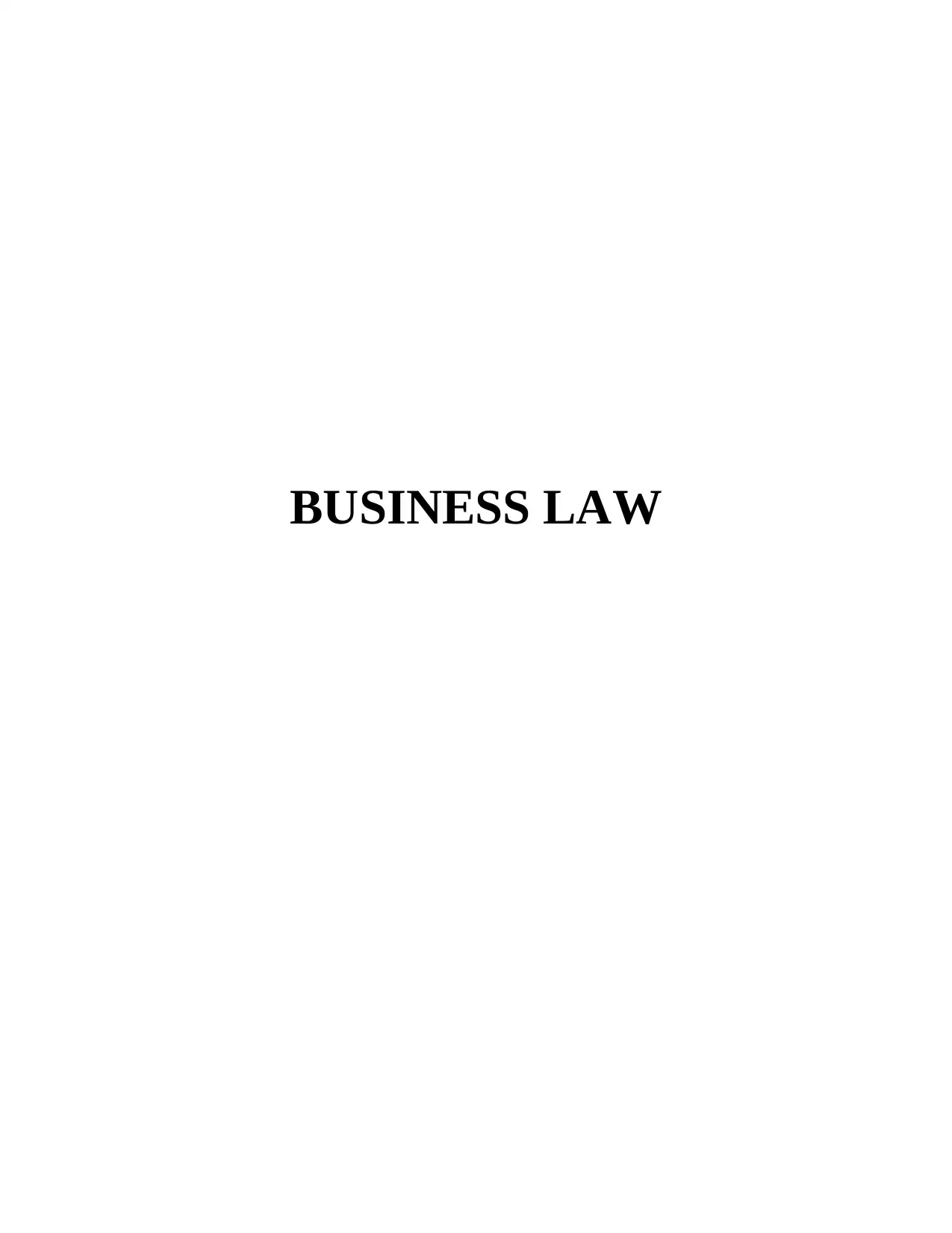
BUSINESS LAW
Secure Best Marks with AI Grader
Need help grading? Try our AI Grader for instant feedback on your assignments.
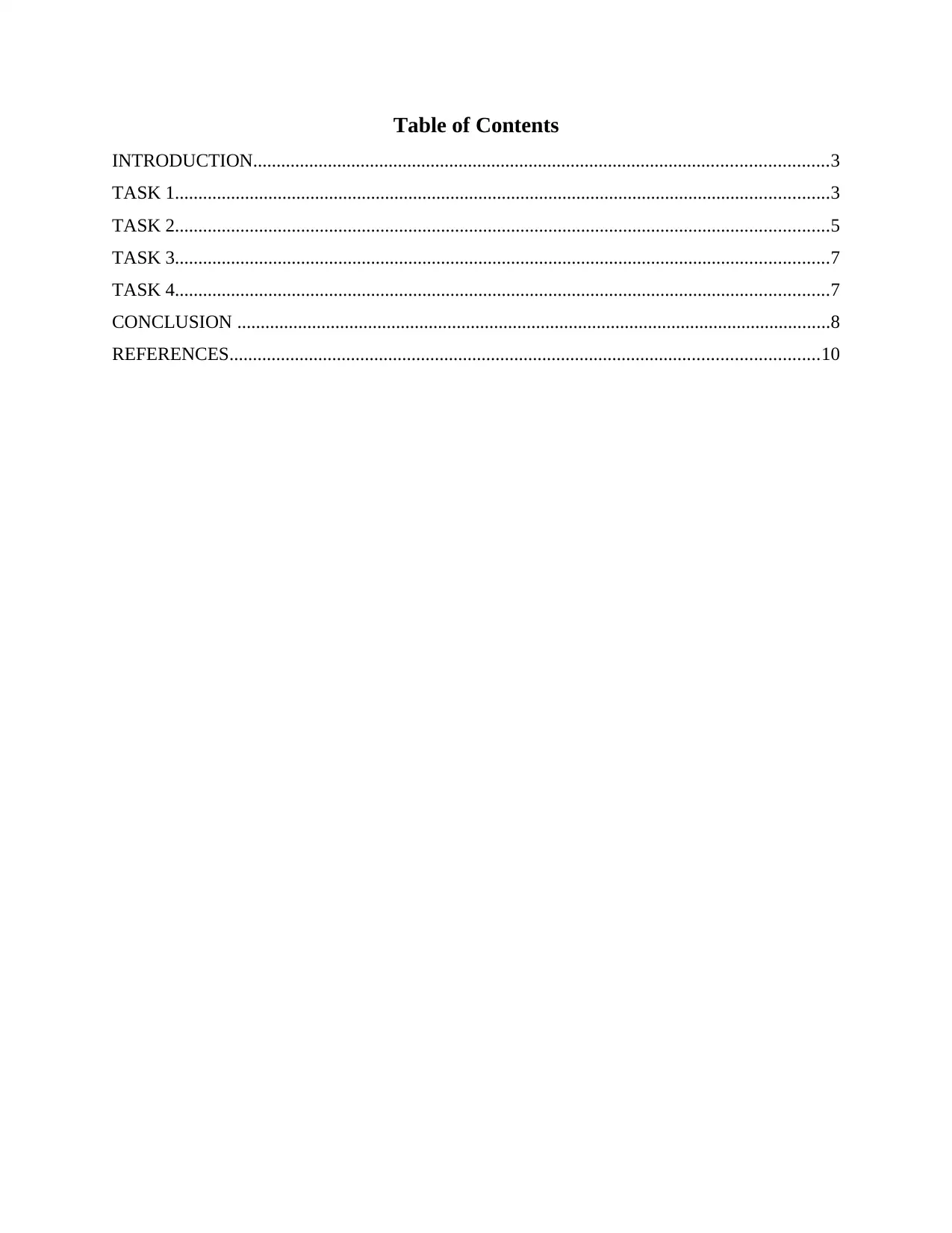
Table of Contents
INTRODUCTION...........................................................................................................................3
TASK 1............................................................................................................................................3
TASK 2............................................................................................................................................5
TASK 3............................................................................................................................................7
TASK 4............................................................................................................................................7
CONCLUSION ...............................................................................................................................8
REFERENCES..............................................................................................................................10
INTRODUCTION...........................................................................................................................3
TASK 1............................................................................................................................................3
TASK 2............................................................................................................................................5
TASK 3............................................................................................................................................7
TASK 4............................................................................................................................................7
CONCLUSION ...............................................................................................................................8
REFERENCES..............................................................................................................................10
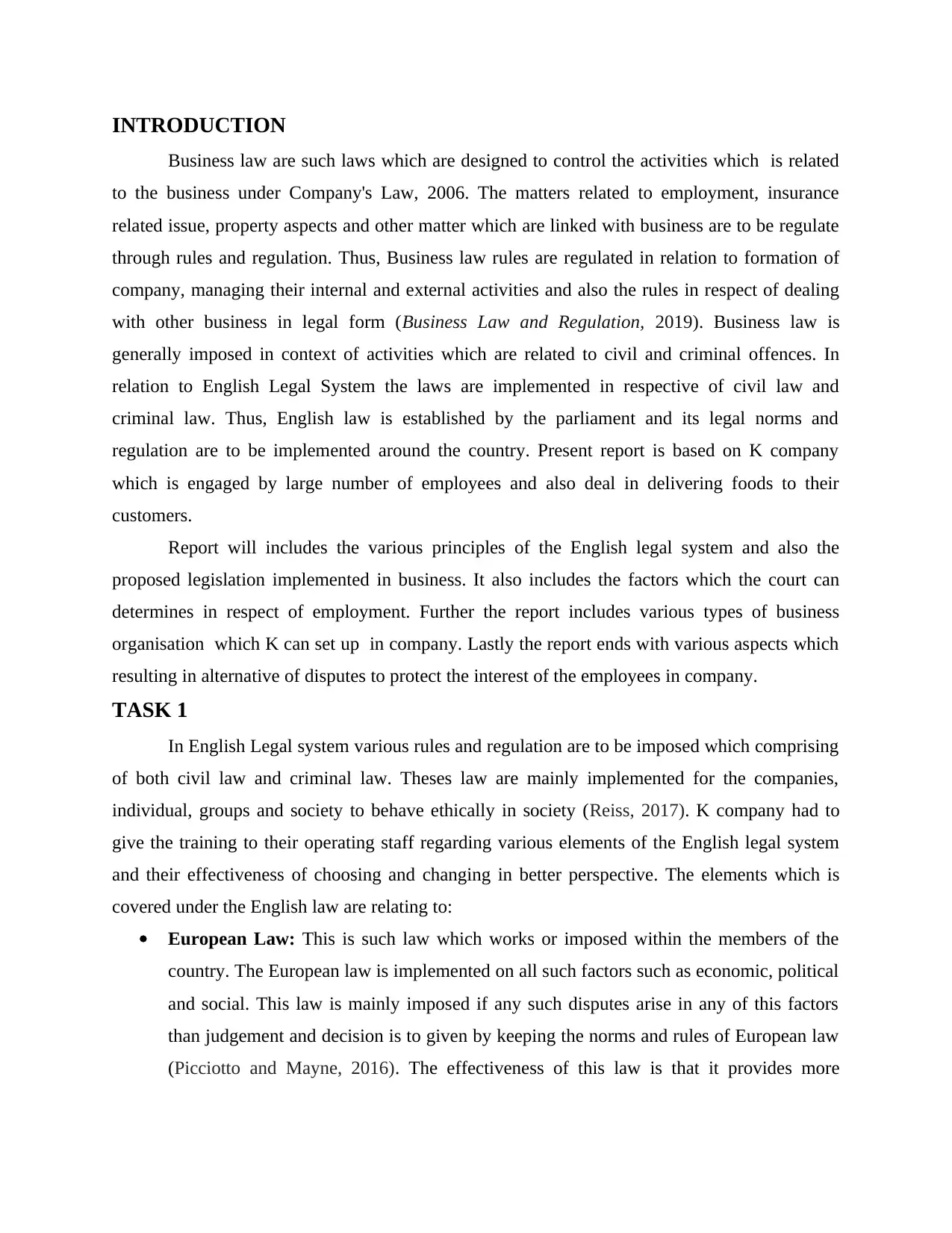
INTRODUCTION
Business law are such laws which are designed to control the activities which is related
to the business under Company's Law, 2006. The matters related to employment, insurance
related issue, property aspects and other matter which are linked with business are to be regulate
through rules and regulation. Thus, Business law rules are regulated in relation to formation of
company, managing their internal and external activities and also the rules in respect of dealing
with other business in legal form (Business Law and Regulation, 2019). Business law is
generally imposed in context of activities which are related to civil and criminal offences. In
relation to English Legal System the laws are implemented in respective of civil law and
criminal law. Thus, English law is established by the parliament and its legal norms and
regulation are to be implemented around the country. Present report is based on K company
which is engaged by large number of employees and also deal in delivering foods to their
customers.
Report will includes the various principles of the English legal system and also the
proposed legislation implemented in business. It also includes the factors which the court can
determines in respect of employment. Further the report includes various types of business
organisation which K can set up in company. Lastly the report ends with various aspects which
resulting in alternative of disputes to protect the interest of the employees in company.
TASK 1
In English Legal system various rules and regulation are to be imposed which comprising
of both civil law and criminal law. Theses law are mainly implemented for the companies,
individual, groups and society to behave ethically in society (Reiss, 2017). K company had to
give the training to their operating staff regarding various elements of the English legal system
and their effectiveness of choosing and changing in better perspective. The elements which is
covered under the English law are relating to:
European Law: This is such law which works or imposed within the members of the
country. The European law is implemented on all such factors such as economic, political
and social. This law is mainly imposed if any such disputes arise in any of this factors
than judgement and decision is to given by keeping the norms and rules of European law
(Picciotto and Mayne, 2016). The effectiveness of this law is that it provides more
Business law are such laws which are designed to control the activities which is related
to the business under Company's Law, 2006. The matters related to employment, insurance
related issue, property aspects and other matter which are linked with business are to be regulate
through rules and regulation. Thus, Business law rules are regulated in relation to formation of
company, managing their internal and external activities and also the rules in respect of dealing
with other business in legal form (Business Law and Regulation, 2019). Business law is
generally imposed in context of activities which are related to civil and criminal offences. In
relation to English Legal System the laws are implemented in respective of civil law and
criminal law. Thus, English law is established by the parliament and its legal norms and
regulation are to be implemented around the country. Present report is based on K company
which is engaged by large number of employees and also deal in delivering foods to their
customers.
Report will includes the various principles of the English legal system and also the
proposed legislation implemented in business. It also includes the factors which the court can
determines in respect of employment. Further the report includes various types of business
organisation which K can set up in company. Lastly the report ends with various aspects which
resulting in alternative of disputes to protect the interest of the employees in company.
TASK 1
In English Legal system various rules and regulation are to be imposed which comprising
of both civil law and criminal law. Theses law are mainly implemented for the companies,
individual, groups and society to behave ethically in society (Reiss, 2017). K company had to
give the training to their operating staff regarding various elements of the English legal system
and their effectiveness of choosing and changing in better perspective. The elements which is
covered under the English law are relating to:
European Law: This is such law which works or imposed within the members of the
country. The European law is implemented on all such factors such as economic, political
and social. This law is mainly imposed if any such disputes arise in any of this factors
than judgement and decision is to given by keeping the norms and rules of European law
(Picciotto and Mayne, 2016). The effectiveness of this law is that it provides more
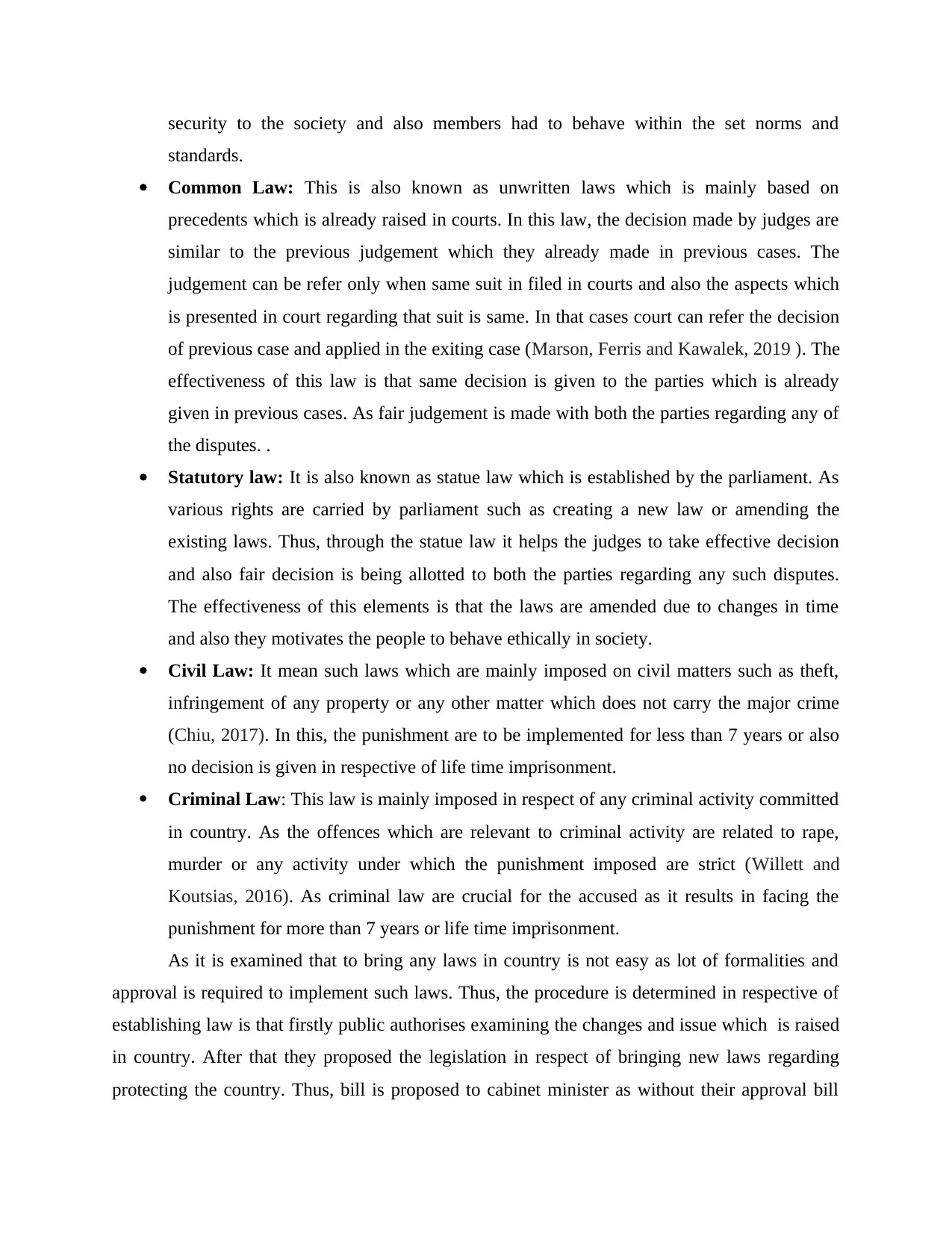
security to the society and also members had to behave within the set norms and
standards.
Common Law: This is also known as unwritten laws which is mainly based on
precedents which is already raised in courts. In this law, the decision made by judges are
similar to the previous judgement which they already made in previous cases. The
judgement can be refer only when same suit in filed in courts and also the aspects which
is presented in court regarding that suit is same. In that cases court can refer the decision
of previous case and applied in the exiting case (Marson, Ferris and Kawalek, 2019 ). The
effectiveness of this law is that same decision is given to the parties which is already
given in previous cases. As fair judgement is made with both the parties regarding any of
the disputes. .
Statutory law: It is also known as statue law which is established by the parliament. As
various rights are carried by parliament such as creating a new law or amending the
existing laws. Thus, through the statue law it helps the judges to take effective decision
and also fair decision is being allotted to both the parties regarding any such disputes.
The effectiveness of this elements is that the laws are amended due to changes in time
and also they motivates the people to behave ethically in society.
Civil Law: It mean such laws which are mainly imposed on civil matters such as theft,
infringement of any property or any other matter which does not carry the major crime
(Chiu, 2017). In this, the punishment are to be implemented for less than 7 years or also
no decision is given in respective of life time imprisonment.
Criminal Law: This law is mainly imposed in respect of any criminal activity committed
in country. As the offences which are relevant to criminal activity are related to rape,
murder or any activity under which the punishment imposed are strict (Willett and
Koutsias, 2016). As criminal law are crucial for the accused as it results in facing the
punishment for more than 7 years or life time imprisonment.
As it is examined that to bring any laws in country is not easy as lot of formalities and
approval is required to implement such laws. Thus, the procedure is determined in respective of
establishing law is that firstly public authorises examining the changes and issue which is raised
in country. After that they proposed the legislation in respect of bringing new laws regarding
protecting the country. Thus, bill is proposed to cabinet minister as without their approval bill
standards.
Common Law: This is also known as unwritten laws which is mainly based on
precedents which is already raised in courts. In this law, the decision made by judges are
similar to the previous judgement which they already made in previous cases. The
judgement can be refer only when same suit in filed in courts and also the aspects which
is presented in court regarding that suit is same. In that cases court can refer the decision
of previous case and applied in the exiting case (Marson, Ferris and Kawalek, 2019 ). The
effectiveness of this law is that same decision is given to the parties which is already
given in previous cases. As fair judgement is made with both the parties regarding any of
the disputes. .
Statutory law: It is also known as statue law which is established by the parliament. As
various rights are carried by parliament such as creating a new law or amending the
existing laws. Thus, through the statue law it helps the judges to take effective decision
and also fair decision is being allotted to both the parties regarding any such disputes.
The effectiveness of this elements is that the laws are amended due to changes in time
and also they motivates the people to behave ethically in society.
Civil Law: It mean such laws which are mainly imposed on civil matters such as theft,
infringement of any property or any other matter which does not carry the major crime
(Chiu, 2017). In this, the punishment are to be implemented for less than 7 years or also
no decision is given in respective of life time imprisonment.
Criminal Law: This law is mainly imposed in respect of any criminal activity committed
in country. As the offences which are relevant to criminal activity are related to rape,
murder or any activity under which the punishment imposed are strict (Willett and
Koutsias, 2016). As criminal law are crucial for the accused as it results in facing the
punishment for more than 7 years or life time imprisonment.
As it is examined that to bring any laws in country is not easy as lot of formalities and
approval is required to implement such laws. Thus, the procedure is determined in respective of
establishing law is that firstly public authorises examining the changes and issue which is raised
in country. After that they proposed the legislation in respect of bringing new laws regarding
protecting the country. Thus, bill is proposed to cabinet minister as without their approval bill
Secure Best Marks with AI Grader
Need help grading? Try our AI Grader for instant feedback on your assignments.
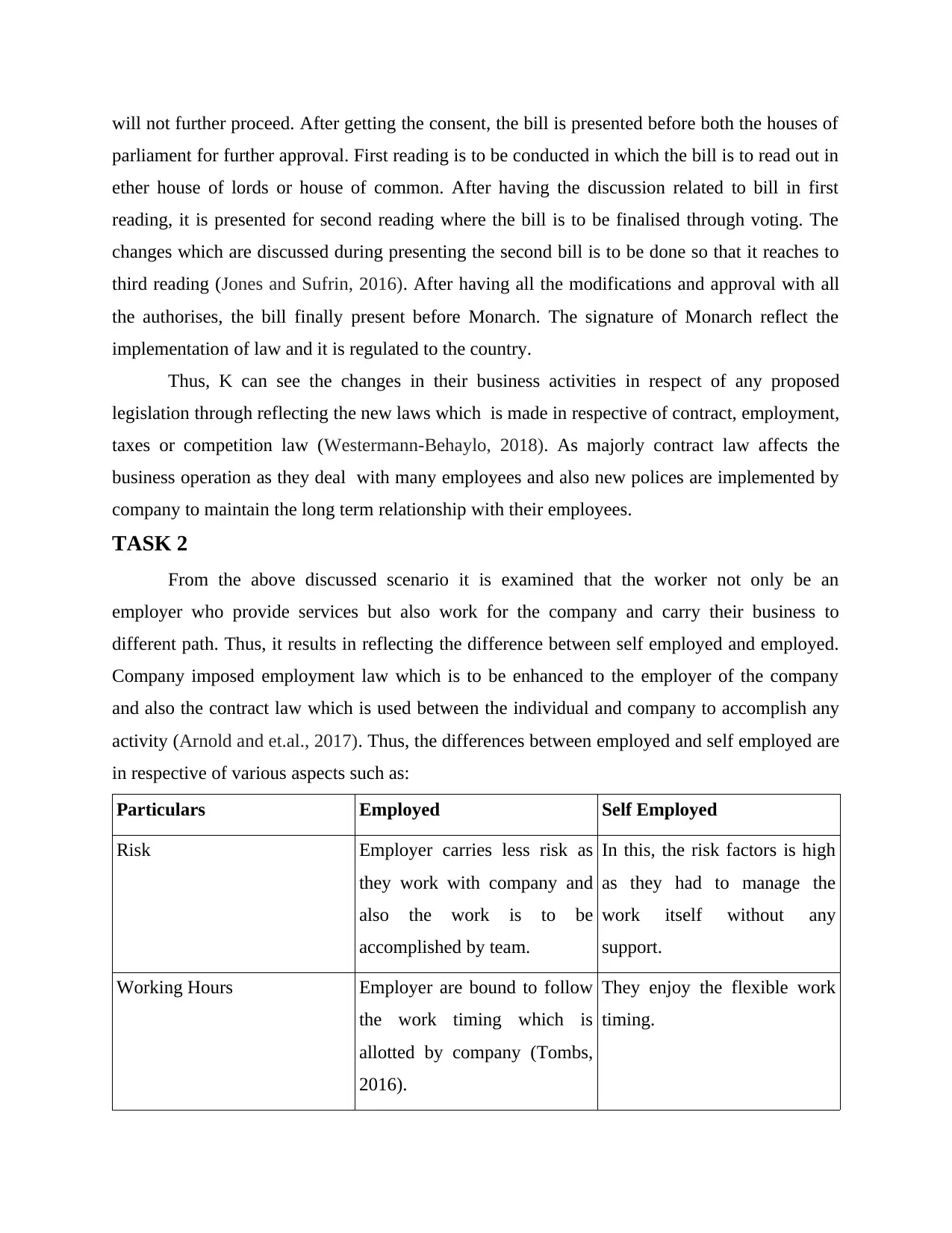
will not further proceed. After getting the consent, the bill is presented before both the houses of
parliament for further approval. First reading is to be conducted in which the bill is to read out in
ether house of lords or house of common. After having the discussion related to bill in first
reading, it is presented for second reading where the bill is to be finalised through voting. The
changes which are discussed during presenting the second bill is to be done so that it reaches to
third reading (Jones and Sufrin, 2016). After having all the modifications and approval with all
the authorises, the bill finally present before Monarch. The signature of Monarch reflect the
implementation of law and it is regulated to the country.
Thus, K can see the changes in their business activities in respect of any proposed
legislation through reflecting the new laws which is made in respective of contract, employment,
taxes or competition law (Westermann-Behaylo, 2018). As majorly contract law affects the
business operation as they deal with many employees and also new polices are implemented by
company to maintain the long term relationship with their employees.
TASK 2
From the above discussed scenario it is examined that the worker not only be an
employer who provide services but also work for the company and carry their business to
different path. Thus, it results in reflecting the difference between self employed and employed.
Company imposed employment law which is to be enhanced to the employer of the company
and also the contract law which is used between the individual and company to accomplish any
activity (Arnold and et.al., 2017). Thus, the differences between employed and self employed are
in respective of various aspects such as:
Particulars Employed Self Employed
Risk Employer carries less risk as
they work with company and
also the work is to be
accomplished by team.
In this, the risk factors is high
as they had to manage the
work itself without any
support.
Working Hours Employer are bound to follow
the work timing which is
allotted by company (Tombs,
2016).
They enjoy the flexible work
timing.
parliament for further approval. First reading is to be conducted in which the bill is to read out in
ether house of lords or house of common. After having the discussion related to bill in first
reading, it is presented for second reading where the bill is to be finalised through voting. The
changes which are discussed during presenting the second bill is to be done so that it reaches to
third reading (Jones and Sufrin, 2016). After having all the modifications and approval with all
the authorises, the bill finally present before Monarch. The signature of Monarch reflect the
implementation of law and it is regulated to the country.
Thus, K can see the changes in their business activities in respect of any proposed
legislation through reflecting the new laws which is made in respective of contract, employment,
taxes or competition law (Westermann-Behaylo, 2018). As majorly contract law affects the
business operation as they deal with many employees and also new polices are implemented by
company to maintain the long term relationship with their employees.
TASK 2
From the above discussed scenario it is examined that the worker not only be an
employer who provide services but also work for the company and carry their business to
different path. Thus, it results in reflecting the difference between self employed and employed.
Company imposed employment law which is to be enhanced to the employer of the company
and also the contract law which is used between the individual and company to accomplish any
activity (Arnold and et.al., 2017). Thus, the differences between employed and self employed are
in respective of various aspects such as:
Particulars Employed Self Employed
Risk Employer carries less risk as
they work with company and
also the work is to be
accomplished by team.
In this, the risk factors is high
as they had to manage the
work itself without any
support.
Working Hours Employer are bound to follow
the work timing which is
allotted by company (Tombs,
2016).
They enjoy the flexible work
timing.
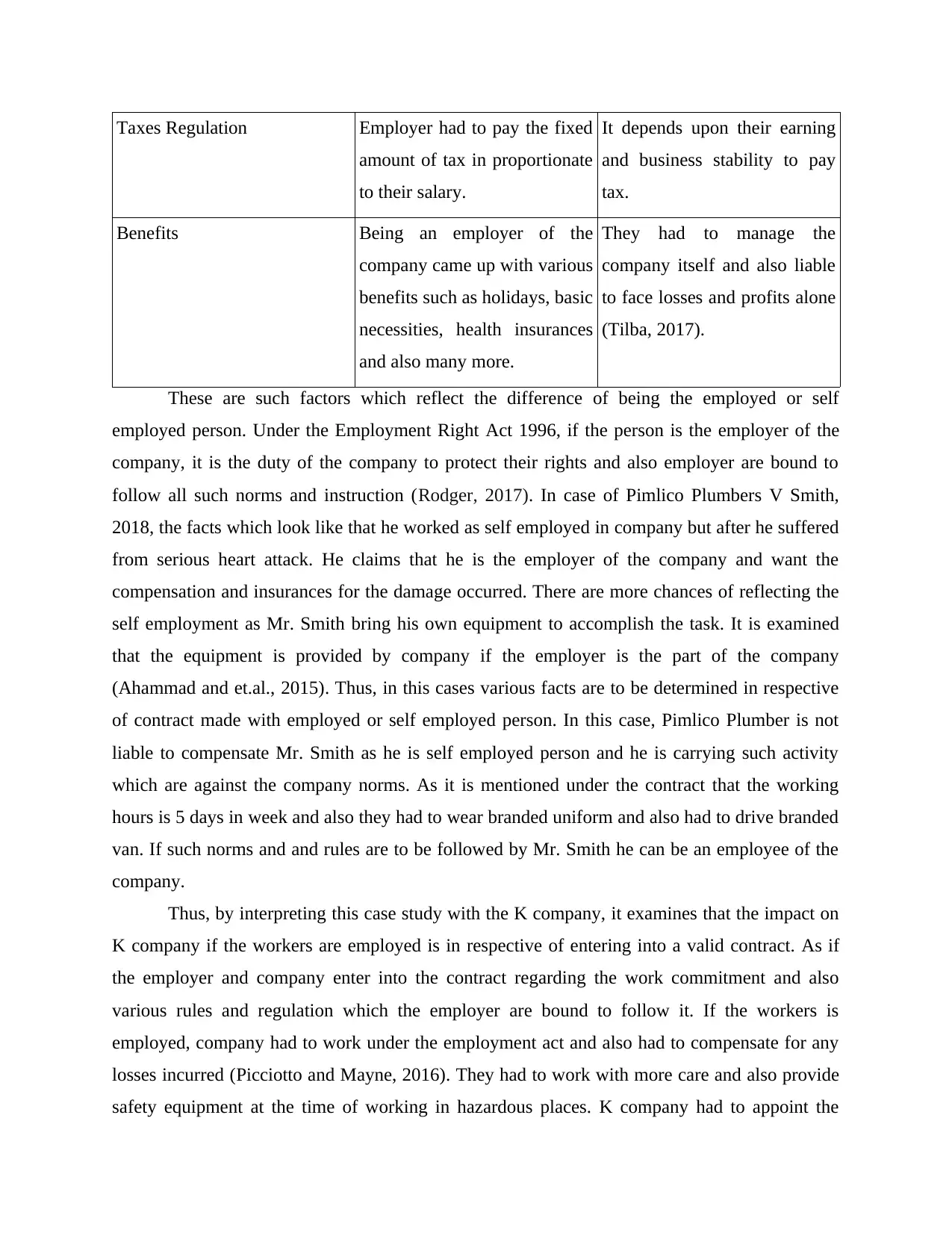
Taxes Regulation Employer had to pay the fixed
amount of tax in proportionate
to their salary.
It depends upon their earning
and business stability to pay
tax.
Benefits Being an employer of the
company came up with various
benefits such as holidays, basic
necessities, health insurances
and also many more.
They had to manage the
company itself and also liable
to face losses and profits alone
(Tilba, 2017).
These are such factors which reflect the difference of being the employed or self
employed person. Under the Employment Right Act 1996, if the person is the employer of the
company, it is the duty of the company to protect their rights and also employer are bound to
follow all such norms and instruction (Rodger, 2017). In case of Pimlico Plumbers V Smith,
2018, the facts which look like that he worked as self employed in company but after he suffered
from serious heart attack. He claims that he is the employer of the company and want the
compensation and insurances for the damage occurred. There are more chances of reflecting the
self employment as Mr. Smith bring his own equipment to accomplish the task. It is examined
that the equipment is provided by company if the employer is the part of the company
(Ahammad and et.al., 2015). Thus, in this cases various facts are to be determined in respective
of contract made with employed or self employed person. In this case, Pimlico Plumber is not
liable to compensate Mr. Smith as he is self employed person and he is carrying such activity
which are against the company norms. As it is mentioned under the contract that the working
hours is 5 days in week and also they had to wear branded uniform and also had to drive branded
van. If such norms and and rules are to be followed by Mr. Smith he can be an employee of the
company.
Thus, by interpreting this case study with the K company, it examines that the impact on
K company if the workers are employed is in respective of entering into a valid contract. As if
the employer and company enter into the contract regarding the work commitment and also
various rules and regulation which the employer are bound to follow it. If the workers is
employed, company had to work under the employment act and also had to compensate for any
losses incurred (Picciotto and Mayne, 2016). They had to work with more care and also provide
safety equipment at the time of working in hazardous places. K company had to appoint the
amount of tax in proportionate
to their salary.
It depends upon their earning
and business stability to pay
tax.
Benefits Being an employer of the
company came up with various
benefits such as holidays, basic
necessities, health insurances
and also many more.
They had to manage the
company itself and also liable
to face losses and profits alone
(Tilba, 2017).
These are such factors which reflect the difference of being the employed or self
employed person. Under the Employment Right Act 1996, if the person is the employer of the
company, it is the duty of the company to protect their rights and also employer are bound to
follow all such norms and instruction (Rodger, 2017). In case of Pimlico Plumbers V Smith,
2018, the facts which look like that he worked as self employed in company but after he suffered
from serious heart attack. He claims that he is the employer of the company and want the
compensation and insurances for the damage occurred. There are more chances of reflecting the
self employment as Mr. Smith bring his own equipment to accomplish the task. It is examined
that the equipment is provided by company if the employer is the part of the company
(Ahammad and et.al., 2015). Thus, in this cases various facts are to be determined in respective
of contract made with employed or self employed person. In this case, Pimlico Plumber is not
liable to compensate Mr. Smith as he is self employed person and he is carrying such activity
which are against the company norms. As it is mentioned under the contract that the working
hours is 5 days in week and also they had to wear branded uniform and also had to drive branded
van. If such norms and and rules are to be followed by Mr. Smith he can be an employee of the
company.
Thus, by interpreting this case study with the K company, it examines that the impact on
K company if the workers are employed is in respective of entering into a valid contract. As if
the employer and company enter into the contract regarding the work commitment and also
various rules and regulation which the employer are bound to follow it. If the workers is
employed, company had to work under the employment act and also had to compensate for any
losses incurred (Picciotto and Mayne, 2016). They had to work with more care and also provide
safety equipment at the time of working in hazardous places. K company had to appoint the
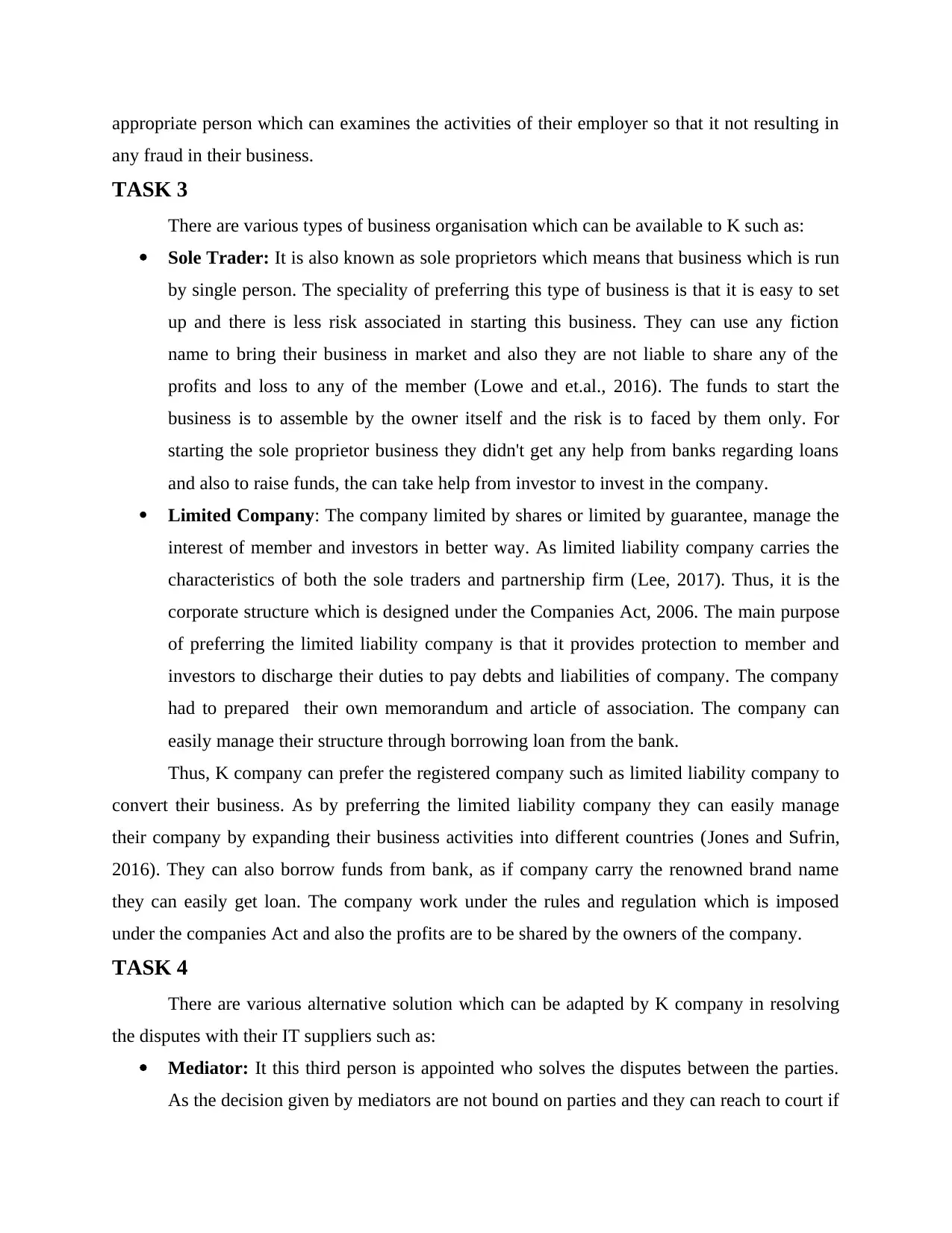
appropriate person which can examines the activities of their employer so that it not resulting in
any fraud in their business.
TASK 3
There are various types of business organisation which can be available to K such as:
Sole Trader: It is also known as sole proprietors which means that business which is run
by single person. The speciality of preferring this type of business is that it is easy to set
up and there is less risk associated in starting this business. They can use any fiction
name to bring their business in market and also they are not liable to share any of the
profits and loss to any of the member (Lowe and et.al., 2016). The funds to start the
business is to assemble by the owner itself and the risk is to faced by them only. For
starting the sole proprietor business they didn't get any help from banks regarding loans
and also to raise funds, the can take help from investor to invest in the company.
Limited Company: The company limited by shares or limited by guarantee, manage the
interest of member and investors in better way. As limited liability company carries the
characteristics of both the sole traders and partnership firm (Lee, 2017). Thus, it is the
corporate structure which is designed under the Companies Act, 2006. The main purpose
of preferring the limited liability company is that it provides protection to member and
investors to discharge their duties to pay debts and liabilities of company. The company
had to prepared their own memorandum and article of association. The company can
easily manage their structure through borrowing loan from the bank.
Thus, K company can prefer the registered company such as limited liability company to
convert their business. As by preferring the limited liability company they can easily manage
their company by expanding their business activities into different countries (Jones and Sufrin,
2016). They can also borrow funds from bank, as if company carry the renowned brand name
they can easily get loan. The company work under the rules and regulation which is imposed
under the companies Act and also the profits are to be shared by the owners of the company.
TASK 4
There are various alternative solution which can be adapted by K company in resolving
the disputes with their IT suppliers such as:
Mediator: It this third person is appointed who solves the disputes between the parties.
As the decision given by mediators are not bound on parties and they can reach to court if
any fraud in their business.
TASK 3
There are various types of business organisation which can be available to K such as:
Sole Trader: It is also known as sole proprietors which means that business which is run
by single person. The speciality of preferring this type of business is that it is easy to set
up and there is less risk associated in starting this business. They can use any fiction
name to bring their business in market and also they are not liable to share any of the
profits and loss to any of the member (Lowe and et.al., 2016). The funds to start the
business is to assemble by the owner itself and the risk is to faced by them only. For
starting the sole proprietor business they didn't get any help from banks regarding loans
and also to raise funds, the can take help from investor to invest in the company.
Limited Company: The company limited by shares or limited by guarantee, manage the
interest of member and investors in better way. As limited liability company carries the
characteristics of both the sole traders and partnership firm (Lee, 2017). Thus, it is the
corporate structure which is designed under the Companies Act, 2006. The main purpose
of preferring the limited liability company is that it provides protection to member and
investors to discharge their duties to pay debts and liabilities of company. The company
had to prepared their own memorandum and article of association. The company can
easily manage their structure through borrowing loan from the bank.
Thus, K company can prefer the registered company such as limited liability company to
convert their business. As by preferring the limited liability company they can easily manage
their company by expanding their business activities into different countries (Jones and Sufrin,
2016). They can also borrow funds from bank, as if company carry the renowned brand name
they can easily get loan. The company work under the rules and regulation which is imposed
under the companies Act and also the profits are to be shared by the owners of the company.
TASK 4
There are various alternative solution which can be adapted by K company in resolving
the disputes with their IT suppliers such as:
Mediator: It this third person is appointed who solves the disputes between the parties.
As the decision given by mediators are not bound on parties and they can reach to court if
Paraphrase This Document
Need a fresh take? Get an instant paraphrase of this document with our AI Paraphraser
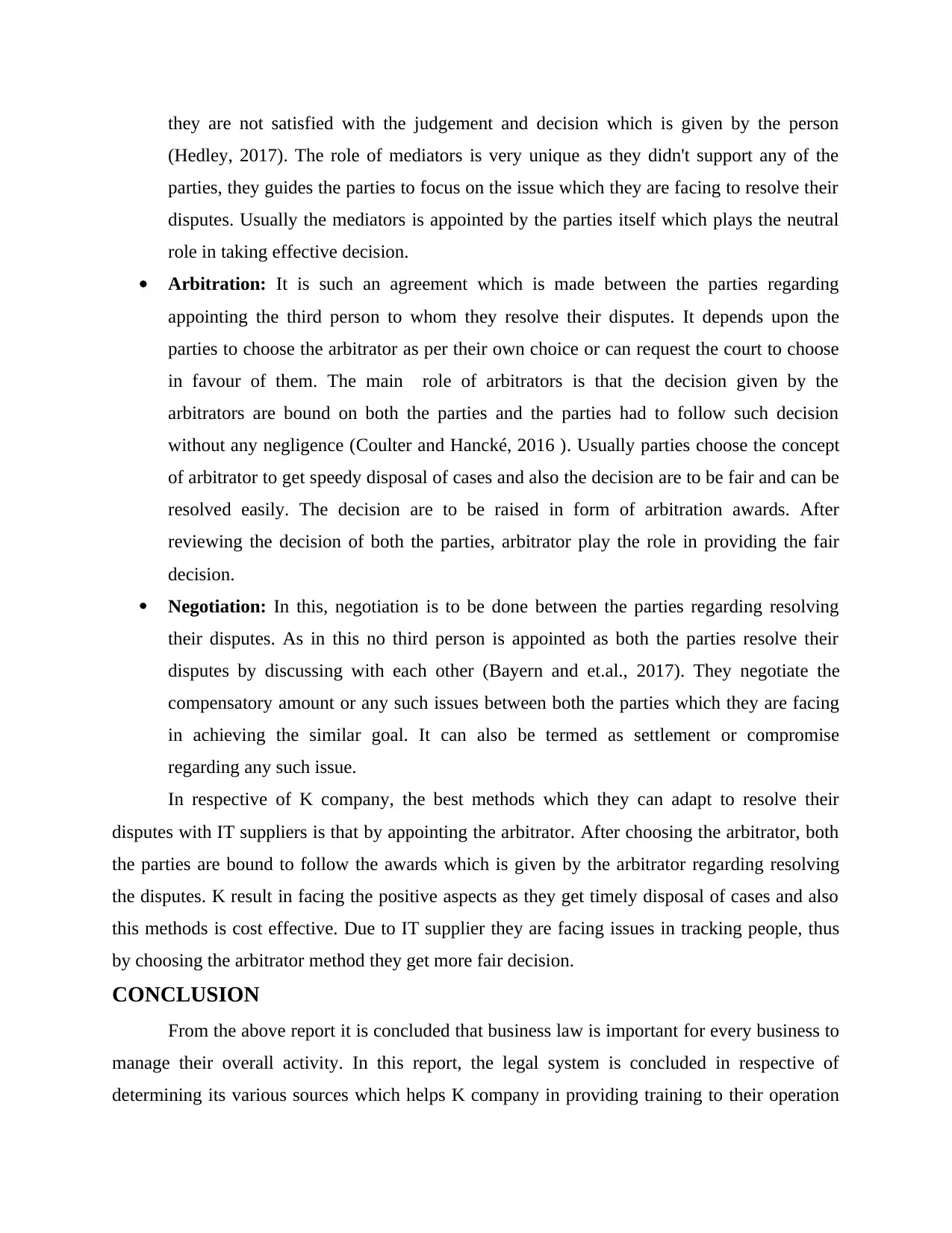
they are not satisfied with the judgement and decision which is given by the person
(Hedley, 2017). The role of mediators is very unique as they didn't support any of the
parties, they guides the parties to focus on the issue which they are facing to resolve their
disputes. Usually the mediators is appointed by the parties itself which plays the neutral
role in taking effective decision.
Arbitration: It is such an agreement which is made between the parties regarding
appointing the third person to whom they resolve their disputes. It depends upon the
parties to choose the arbitrator as per their own choice or can request the court to choose
in favour of them. The main role of arbitrators is that the decision given by the
arbitrators are bound on both the parties and the parties had to follow such decision
without any negligence (Coulter and Hancké, 2016 ). Usually parties choose the concept
of arbitrator to get speedy disposal of cases and also the decision are to be fair and can be
resolved easily. The decision are to be raised in form of arbitration awards. After
reviewing the decision of both the parties, arbitrator play the role in providing the fair
decision.
Negotiation: In this, negotiation is to be done between the parties regarding resolving
their disputes. As in this no third person is appointed as both the parties resolve their
disputes by discussing with each other (Bayern and et.al., 2017). They negotiate the
compensatory amount or any such issues between both the parties which they are facing
in achieving the similar goal. It can also be termed as settlement or compromise
regarding any such issue.
In respective of K company, the best methods which they can adapt to resolve their
disputes with IT suppliers is that by appointing the arbitrator. After choosing the arbitrator, both
the parties are bound to follow the awards which is given by the arbitrator regarding resolving
the disputes. K result in facing the positive aspects as they get timely disposal of cases and also
this methods is cost effective. Due to IT supplier they are facing issues in tracking people, thus
by choosing the arbitrator method they get more fair decision.
CONCLUSION
From the above report it is concluded that business law is important for every business to
manage their overall activity. In this report, the legal system is concluded in respective of
determining its various sources which helps K company in providing training to their operation
(Hedley, 2017). The role of mediators is very unique as they didn't support any of the
parties, they guides the parties to focus on the issue which they are facing to resolve their
disputes. Usually the mediators is appointed by the parties itself which plays the neutral
role in taking effective decision.
Arbitration: It is such an agreement which is made between the parties regarding
appointing the third person to whom they resolve their disputes. It depends upon the
parties to choose the arbitrator as per their own choice or can request the court to choose
in favour of them. The main role of arbitrators is that the decision given by the
arbitrators are bound on both the parties and the parties had to follow such decision
without any negligence (Coulter and Hancké, 2016 ). Usually parties choose the concept
of arbitrator to get speedy disposal of cases and also the decision are to be fair and can be
resolved easily. The decision are to be raised in form of arbitration awards. After
reviewing the decision of both the parties, arbitrator play the role in providing the fair
decision.
Negotiation: In this, negotiation is to be done between the parties regarding resolving
their disputes. As in this no third person is appointed as both the parties resolve their
disputes by discussing with each other (Bayern and et.al., 2017). They negotiate the
compensatory amount or any such issues between both the parties which they are facing
in achieving the similar goal. It can also be termed as settlement or compromise
regarding any such issue.
In respective of K company, the best methods which they can adapt to resolve their
disputes with IT suppliers is that by appointing the arbitrator. After choosing the arbitrator, both
the parties are bound to follow the awards which is given by the arbitrator regarding resolving
the disputes. K result in facing the positive aspects as they get timely disposal of cases and also
this methods is cost effective. Due to IT supplier they are facing issues in tracking people, thus
by choosing the arbitrator method they get more fair decision.
CONCLUSION
From the above report it is concluded that business law is important for every business to
manage their overall activity. In this report, the legal system is concluded in respective of
determining its various sources which helps K company in providing training to their operation
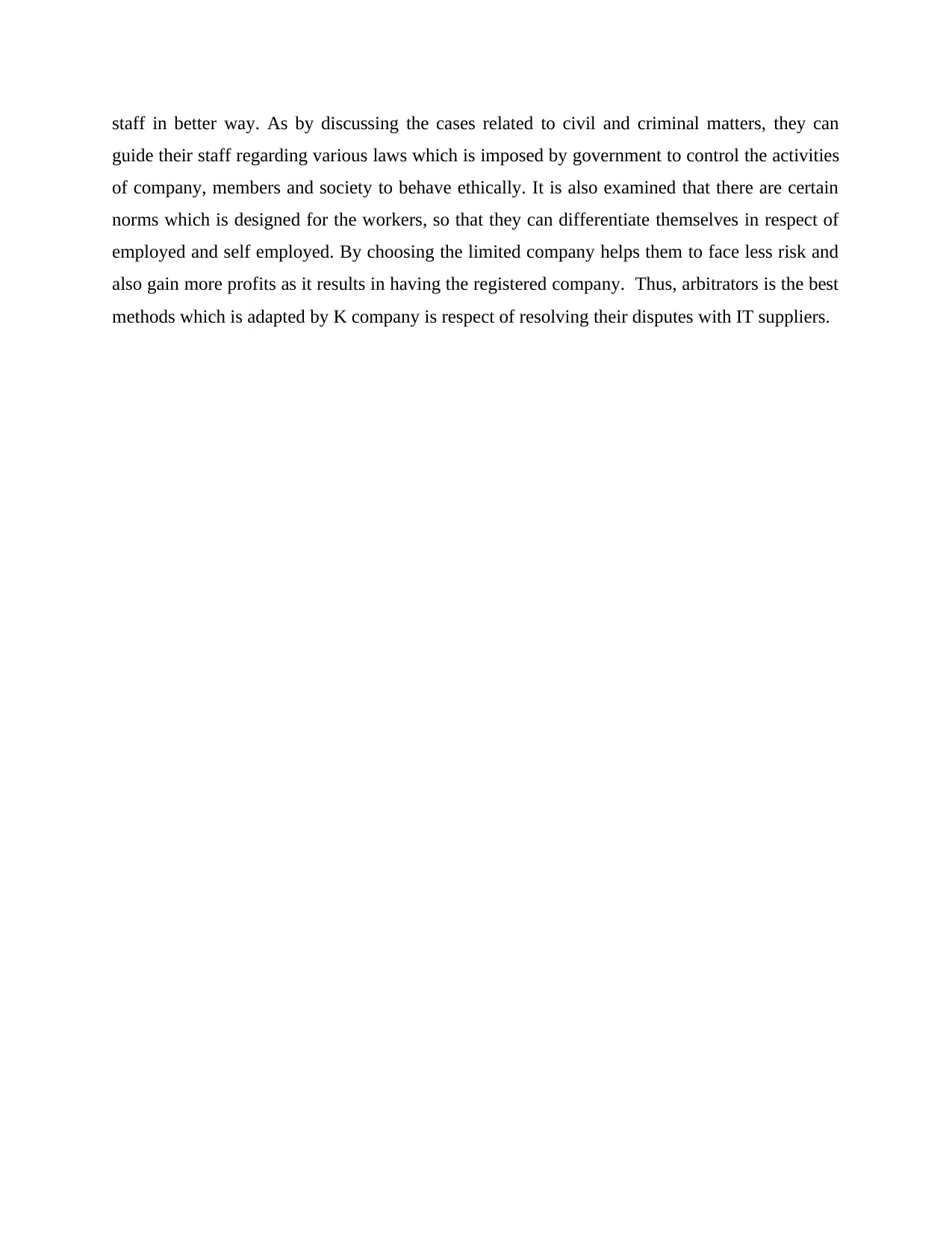
staff in better way. As by discussing the cases related to civil and criminal matters, they can
guide their staff regarding various laws which is imposed by government to control the activities
of company, members and society to behave ethically. It is also examined that there are certain
norms which is designed for the workers, so that they can differentiate themselves in respect of
employed and self employed. By choosing the limited company helps them to face less risk and
also gain more profits as it results in having the registered company. Thus, arbitrators is the best
methods which is adapted by K company is respect of resolving their disputes with IT suppliers.
guide their staff regarding various laws which is imposed by government to control the activities
of company, members and society to behave ethically. It is also examined that there are certain
norms which is designed for the workers, so that they can differentiate themselves in respect of
employed and self employed. By choosing the limited company helps them to face less risk and
also gain more profits as it results in having the registered company. Thus, arbitrators is the best
methods which is adapted by K company is respect of resolving their disputes with IT suppliers.
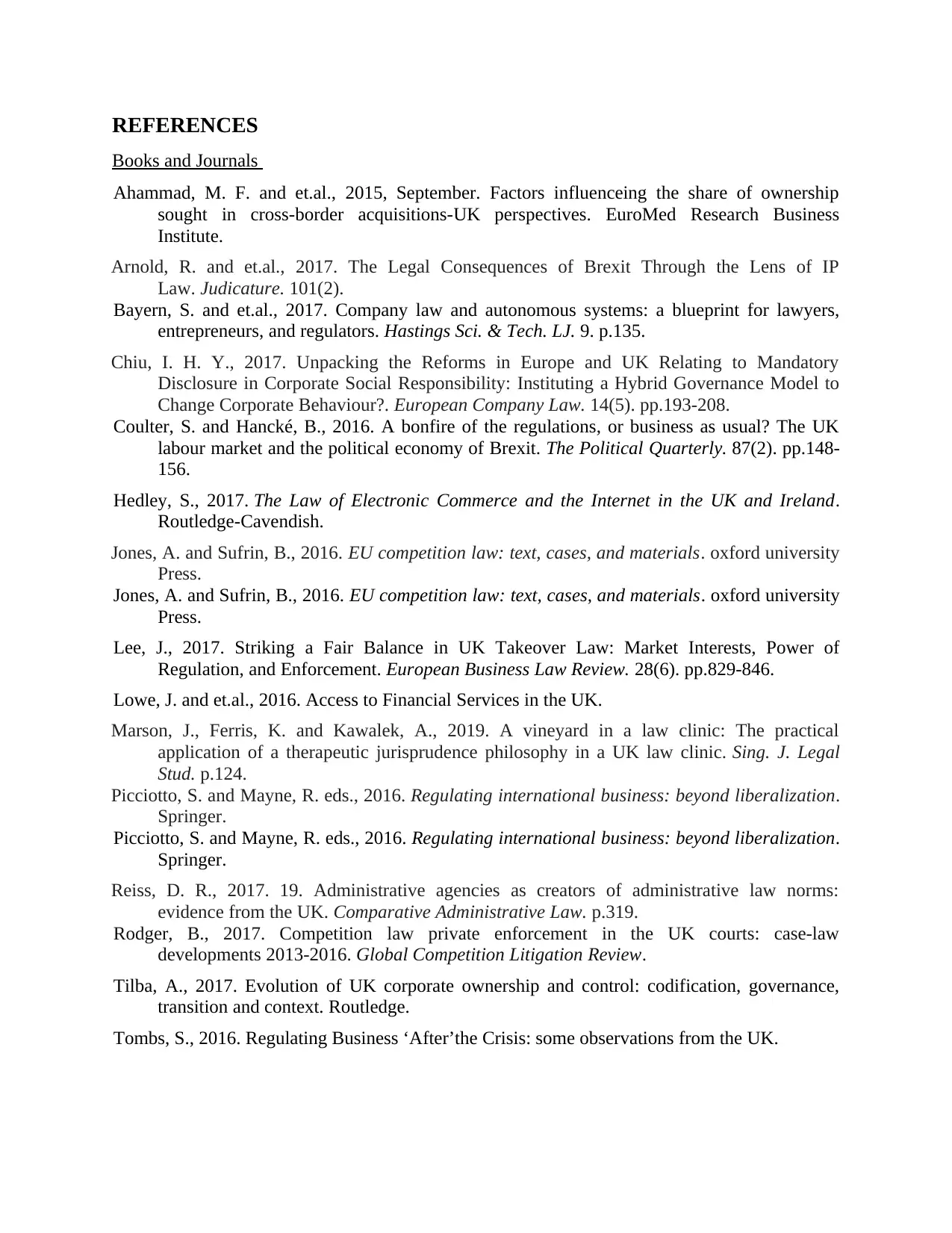
REFERENCES
Books and Journals
Ahammad, M. F. and et.al., 2015, September. Factors influenceing the share of ownership
sought in cross-border acquisitions-UK perspectives. EuroMed Research Business
Institute.
Arnold, R. and et.al., 2017. The Legal Consequences of Brexit Through the Lens of IP
Law. Judicature. 101(2).
Bayern, S. and et.al., 2017. Company law and autonomous systems: a blueprint for lawyers,
entrepreneurs, and regulators. Hastings Sci. & Tech. LJ. 9. p.135.
Chiu, I. H. Y., 2017. Unpacking the Reforms in Europe and UK Relating to Mandatory
Disclosure in Corporate Social Responsibility: Instituting a Hybrid Governance Model to
Change Corporate Behaviour?. European Company Law. 14(5). pp.193-208.
Coulter, S. and Hancké, B., 2016. A bonfire of the regulations, or business as usual? The UK
labour market and the political economy of Brexit. The Political Quarterly. 87(2). pp.148-
156.
Hedley, S., 2017. The Law of Electronic Commerce and the Internet in the UK and Ireland.
Routledge-Cavendish.
Jones, A. and Sufrin, B., 2016. EU competition law: text, cases, and materials. oxford university
Press.
Jones, A. and Sufrin, B., 2016. EU competition law: text, cases, and materials. oxford university
Press.
Lee, J., 2017. Striking a Fair Balance in UK Takeover Law: Market Interests, Power of
Regulation, and Enforcement. European Business Law Review. 28(6). pp.829-846.
Lowe, J. and et.al., 2016. Access to Financial Services in the UK.
Marson, J., Ferris, K. and Kawalek, A., 2019. A vineyard in a law clinic: The practical
application of a therapeutic jurisprudence philosophy in a UK law clinic. Sing. J. Legal
Stud. p.124.
Picciotto, S. and Mayne, R. eds., 2016. Regulating international business: beyond liberalization.
Springer.
Picciotto, S. and Mayne, R. eds., 2016. Regulating international business: beyond liberalization.
Springer.
Reiss, D. R., 2017. 19. Administrative agencies as creators of administrative law norms:
evidence from the UK. Comparative Administrative Law. p.319.
Rodger, B., 2017. Competition law private enforcement in the UK courts: case-law
developments 2013-2016. Global Competition Litigation Review.
Tilba, A., 2017. Evolution of UK corporate ownership and control: codification, governance,
transition and context. Routledge.
Tombs, S., 2016. Regulating Business ‘After’the Crisis: some observations from the UK.
Books and Journals
Ahammad, M. F. and et.al., 2015, September. Factors influenceing the share of ownership
sought in cross-border acquisitions-UK perspectives. EuroMed Research Business
Institute.
Arnold, R. and et.al., 2017. The Legal Consequences of Brexit Through the Lens of IP
Law. Judicature. 101(2).
Bayern, S. and et.al., 2017. Company law and autonomous systems: a blueprint for lawyers,
entrepreneurs, and regulators. Hastings Sci. & Tech. LJ. 9. p.135.
Chiu, I. H. Y., 2017. Unpacking the Reforms in Europe and UK Relating to Mandatory
Disclosure in Corporate Social Responsibility: Instituting a Hybrid Governance Model to
Change Corporate Behaviour?. European Company Law. 14(5). pp.193-208.
Coulter, S. and Hancké, B., 2016. A bonfire of the regulations, or business as usual? The UK
labour market and the political economy of Brexit. The Political Quarterly. 87(2). pp.148-
156.
Hedley, S., 2017. The Law of Electronic Commerce and the Internet in the UK and Ireland.
Routledge-Cavendish.
Jones, A. and Sufrin, B., 2016. EU competition law: text, cases, and materials. oxford university
Press.
Jones, A. and Sufrin, B., 2016. EU competition law: text, cases, and materials. oxford university
Press.
Lee, J., 2017. Striking a Fair Balance in UK Takeover Law: Market Interests, Power of
Regulation, and Enforcement. European Business Law Review. 28(6). pp.829-846.
Lowe, J. and et.al., 2016. Access to Financial Services in the UK.
Marson, J., Ferris, K. and Kawalek, A., 2019. A vineyard in a law clinic: The practical
application of a therapeutic jurisprudence philosophy in a UK law clinic. Sing. J. Legal
Stud. p.124.
Picciotto, S. and Mayne, R. eds., 2016. Regulating international business: beyond liberalization.
Springer.
Picciotto, S. and Mayne, R. eds., 2016. Regulating international business: beyond liberalization.
Springer.
Reiss, D. R., 2017. 19. Administrative agencies as creators of administrative law norms:
evidence from the UK. Comparative Administrative Law. p.319.
Rodger, B., 2017. Competition law private enforcement in the UK courts: case-law
developments 2013-2016. Global Competition Litigation Review.
Tilba, A., 2017. Evolution of UK corporate ownership and control: codification, governance,
transition and context. Routledge.
Tombs, S., 2016. Regulating Business ‘After’the Crisis: some observations from the UK.
Secure Best Marks with AI Grader
Need help grading? Try our AI Grader for instant feedback on your assignments.
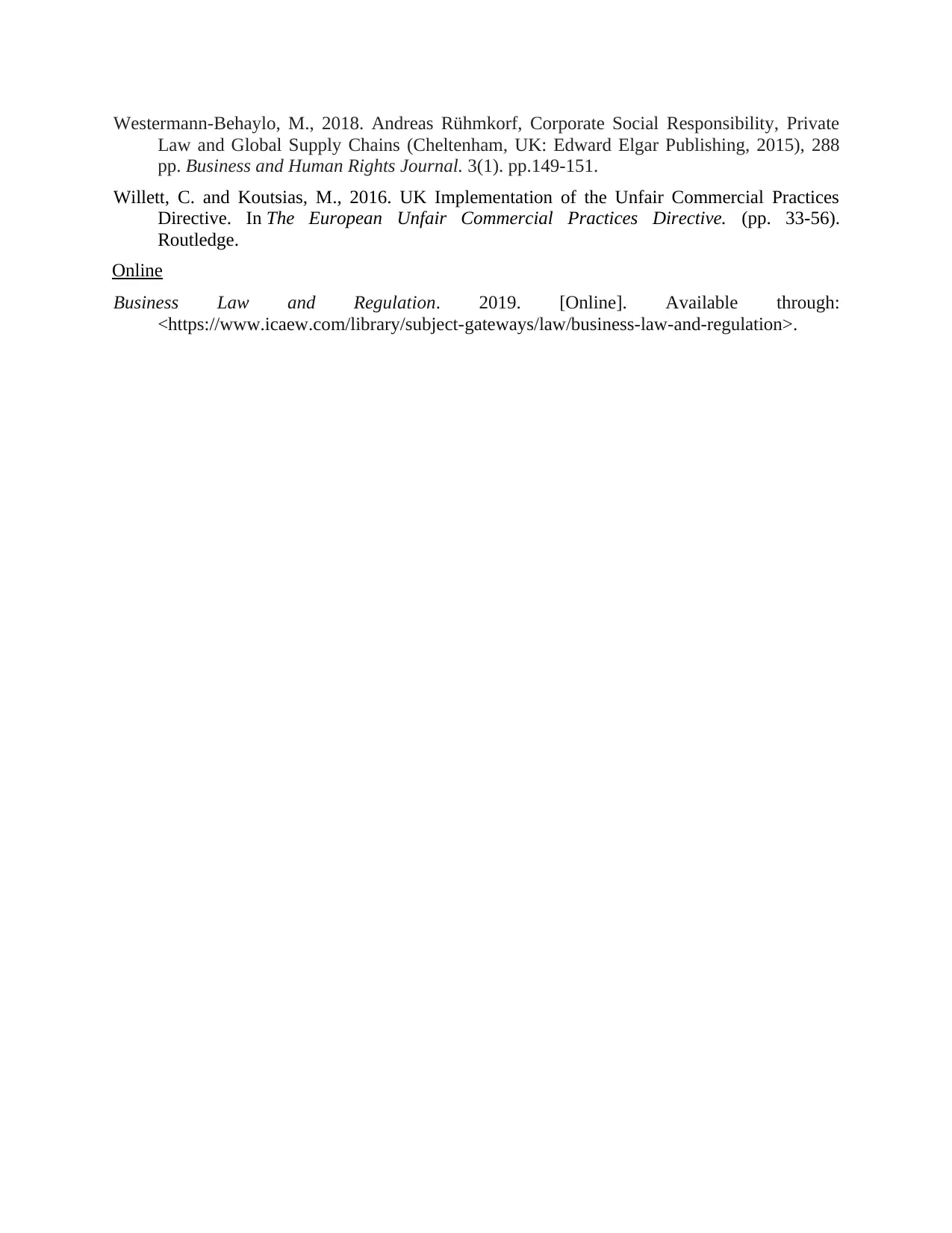
Westermann-Behaylo, M., 2018. Andreas Rühmkorf, Corporate Social Responsibility, Private
Law and Global Supply Chains (Cheltenham, UK: Edward Elgar Publishing, 2015), 288
pp. Business and Human Rights Journal. 3(1). pp.149-151.
Willett, C. and Koutsias, M., 2016. UK Implementation of the Unfair Commercial Practices
Directive. In The European Unfair Commercial Practices Directive. (pp. 33-56).
Routledge.
Online
Business Law and Regulation. 2019. [Online]. Available through:
<https://www.icaew.com/library/subject-gateways/law/business-law-and-regulation>.
Law and Global Supply Chains (Cheltenham, UK: Edward Elgar Publishing, 2015), 288
pp. Business and Human Rights Journal. 3(1). pp.149-151.
Willett, C. and Koutsias, M., 2016. UK Implementation of the Unfair Commercial Practices
Directive. In The European Unfair Commercial Practices Directive. (pp. 33-56).
Routledge.
Online
Business Law and Regulation. 2019. [Online]. Available through:
<https://www.icaew.com/library/subject-gateways/law/business-law-and-regulation>.
1 out of 11
Related Documents
Your All-in-One AI-Powered Toolkit for Academic Success.
+13062052269
info@desklib.com
Available 24*7 on WhatsApp / Email
![[object Object]](/_next/static/media/star-bottom.7253800d.svg)
Unlock your academic potential
© 2024 | Zucol Services PVT LTD | All rights reserved.





